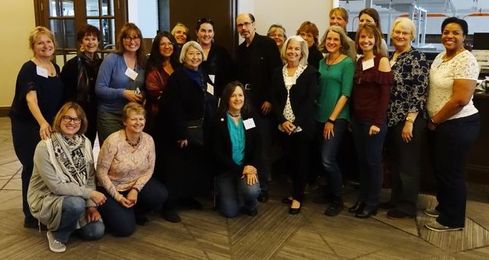 Jeffery Deaver with Sisters in Crime Colorado Jeffery Deaver with Sisters in Crime Colorado I judge the value of a workshop by how many notes I take. At Writing Commercial Fiction, with Jeffery Deaver, I scribbled page after page. I have attended one hour talks by Deaver at writing conferences, but this was my first opportunity to hear the famous, best-selling author for an entire day-long workshop. Three main points impressed me. Rule Number One: Define Your Goal as a Writer Jeffery Deaver writes full time. Before I was published, my goal was to make my living off fiction writing, earning buy-an-island money. Later, two realities crept in. One was that I enjoy reading and writing cozy and gentler amateur sleuth tales, which rarely hit best-seller lists. The other was that I like my job, and the benefits are great. Deaver told the audience the downsides of writing full time. He works six to seven days a week. His personal life has suffered. Writing is a solitary profession. Yet he also loves his career. The universal goals of the commercial fiction writer he defined as a) tell stories, b) make money, and c) gain notoriety. My goals, five years after my first paid publication, have been revised as I've learned the publishing business, but still cover the three universal goals. Many of us reach a "why am I doing this" point at least once a year. Deaver's reminder to define our goals is definitely good advice. Rule Number Two: Remember Your Mission "Yes, you have a mission - to tell the most emotionally engaging story you possibly can." This applies to all genres, whether you're writing a thriller, cozy, or family saga. Deaver emphasized that emotions can be just as powerful whether a character is defusing a ticking bomb or dealing with family relationships. Rule Number Six: Plan Your Book or Story Ahead of Time Deaver spends eight months creating his outline, then spends six weeks writing the book. If you have read his thrillers, you can understand the need to heavily outline the complex plots. I adopted a scaled down version of his technique when I received a contract for a book with a deadline. I knew I'd never make it to my destination of a finished manuscript without a roadmap. Deaver detailed how he outlines, and then incorporates research notes. A new idea I will try is that he goes back when he's finished, and creates a shorter outline to tie in all the changes. My stories always deviate from the original outline, so revisiting the process briefly at the end would certainly help with revisions and creating a synopsis or even the story blurb. Writing Commercial Fiction was a day well spent. I have pages of notes to refresh my memory about dozens of topics like Rejection is a Speed Bump, Not a Brick Wall. As an added bonus, I got to spend time with Sisters in Crime Colorado, and Rocky Mountain Mystery Writers of America.
0 Comments
Your comment will be posted after it is approved.
Leave a Reply. |
Subscribe to this blog: |
Proudly powered by Weebly
 RSS Feed
RSS Feed